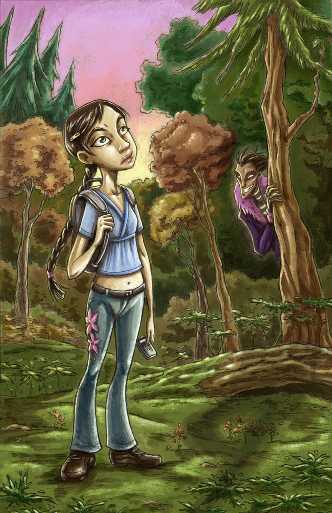Beth has recently ventured into the world of comic books with her work with the Zeros2Heroes people, "a thriving network that connects thousands of creators, producers, and fans of comics in a collaborative and creative environment."
MS: Tell us more about the comics you've been working on; how did it all start / come about?
BAD: Nis, a dear friend of mine, pointed me to the Zeros2Heroes and Aboriginal Peoples Television Network collaborative contest for Aboriginal Canadians to enter the contest. My husband and I went away to working on some concepts and responded to feedback from the community which gave us the opportunity to see these ideas come to life.
Fala, a Native urban fantasy rendition of Alice in Wonderland, is inspired by our friends from a short film script I was writing with them in mind before we heard about the contest. With the help of editor Julian Lawrence and artist Patricio Plaza, we get to see Cowboy Smithx as Trickster, Duane Howard as Badger, Senaqwila Wyss as Fala, and Justin Rain and Shane Zwack as Ace and Spade in comic book form.
Fala's one of those girls who plays video games, but she's still cool, and of course, often too cool to bother to finish her homework or help out her single mom. Sent out to the woods for a homework assignment on edible plants, Fala gets lost (or rather tricked) and finds herself led down a path of life lessons in a dark, strange rez town.
MS: What are some comics with Native American characters in them that stand out to you?
BAD: Although controversial, I have to admit that Myron and I enjoy Scalped. Sure, it's not made by indigenous people, but I feel the people involved are making a shot at proper representation. That, and, where else can you find a comic entirely about modern Natives put out by a big publisher?
MS: What is your opinion about Indigenous characters in comics? Do you feel we portrayed properly?
BAD: Rarely. I won't even open The Red Prophet to give it a try because all I see on the cover is a stereotypically aged Native man with a little white boy named Alvin and think--yeah, another outlet where the focus is on the non-Native character. Of course I could be completely wrong about the series, but I do judge books by their covers. Much like video games, we're often shaped into stereotypes. Halfbreed heroes who slay Indians until they too discover their Indian roots and all is forgiven, the busty hot Native chick who means business in tight skinned leather, you name it. As more of us grow up playing games and reading comics, the more we'll get involved in making our own representations, and I'm looking forward to it.
MS: Do you know of any other Natives in the "biz" (comic industry and/or video game industry)?
BAD: Steve Sanderson is a great artist who has merged the Japanese manga style with his own to tell unique indigenous stories through comic books. His work has been put out by the Healthy Aboriginal Network.
And of course Chad Solomon, co-creator of the Rabbit and Bear Paws.
For more on the subject, see Comic Books Featuring Indians.


No comments:
Post a Comment
Note: Only a member of this blog may post a comment.